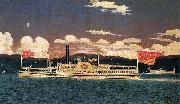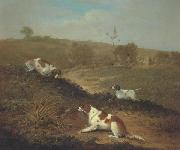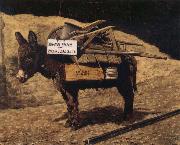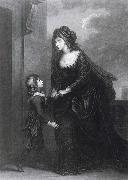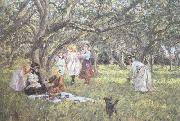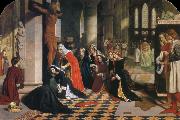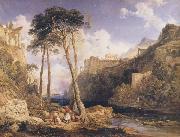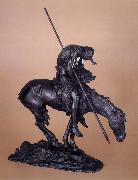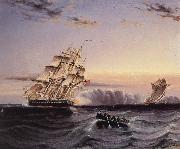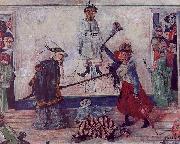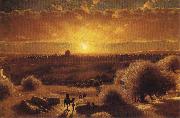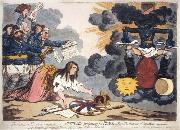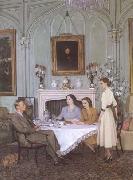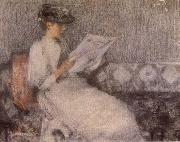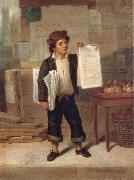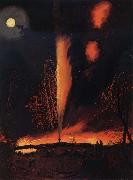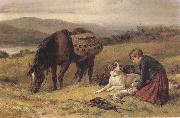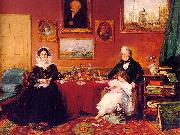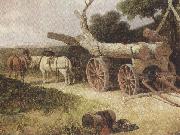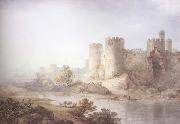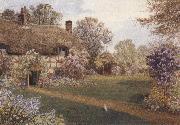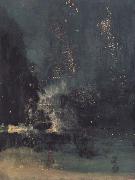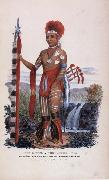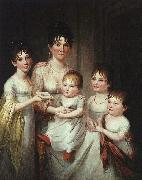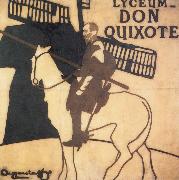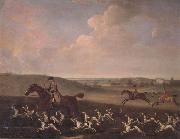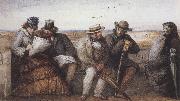|
|
|
|
|
|
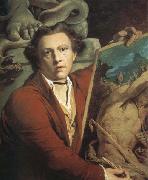 |
James Barry
|
|
b.Oct. 11, 1741, Cork, County Cork, Ire.
d.Feb. 22, 1806, London, England.
Irish
James Barry Gallery |
|
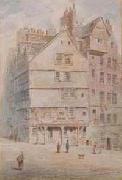 |
James Baynes
|
|
James Baynes (5 April 1766 ?C 12 May 1837) was an English watercolour painter and drawing-master.
Little is known of his family apart from the fact that he was born in Lancaster as the song of a local tradesman and was the eldest of six children, his grandfather being a Catholic priest in Kirkby Lonsdale where his father was born. As a boy he showed a love of the arts and had been employed to draw heads and work devices until Dr. Campbell, a local Physician, having seen some of these works sent some sketches to his friend George Romney. The young Baynes was then sent to London to study under Romney at the expense of Dr. Campbell.
In 1784, at the age of 18 he became a student at the Royal Academy. He wedded Mary Mann (1766-1845) in 1785 at Marylebone Church, London. Their son, Thomas Mann Baynes (1794-1854), was also became a noted watercolour artist. |
|
|
|
|
|
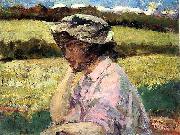 |
James Carroll Beckwith
|
|
(September 23, 1852 - October 24, 1917) was an American landscape, portrait and genre painter whose Impressionist style led to his recognition in the late nineteenth century as a prominent figure in American art.
Carroll Beckwith, as he preferred to be known, was born in Hannibal, Missouri on 23 September 1852, the son of N. M. Beckwith, who was United States Commissioner-General at the Paris Exposition of 1867. However, he grew up in Chicago where his father started a wholesale grocery business. In 1868 aged 16 he studied art at the Chicago Academy of Design under Walter Shirlaw until the great fire of 1871 destroyed eveything (including much of the heart of the city). He then went to New York and studied at the National Academy of Design (of which he afterwards became a member) in New York City under Lemuel Wilmarth and later traveled on to Paris, staying there from November 1873 until 1878.
|
|
|
|
|
|
|
|
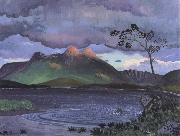 |
James Dickson Innes
|
|
A British landscape painter who specialized in mountain scenes
Welsh Painter, 1887-1914 |
|
|
|
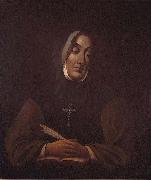 |
James Duncan
|
|
painted Portrait of Mere Marguerite d'Youville in 1825-1881 |
|
|
|
|
|
|
|
|
|
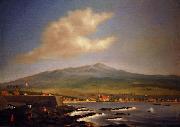 |
James Gay Sawkins
|
|
(1806-1878) was an artist who was born in 1806 in Yeovil, Somerset, England. At the age of 14, he moved to Baltimore, Maryland with his family, where he made his living painting miniature portraits on ivory. He lived in Cuba from 1835 to 1845 and visited Hawaii from January, 1850 to June, 1852. After working in Australia, he returned to England in 1855. Sawkins died in 1878 in Turnham Green (near London), England.
The Honolulu Academy of Arts, Mission House Museum (Honolulu, Hawaii) and the National Library of Australia (Canberra) are among the public collections holding works by James Gay Sawkins.
|
|
|
|
|
|
|
|
|
|
|
|
|
|
|
|
|
|
|
|
|
|
|
|
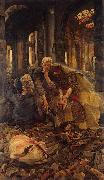 |
James Jacques Joseph Tissot
|
|
(15 October 1836 -- 8 August 1902) was a French painter.
Tissot was born at Nantes. He studied at the École des Beaux-Arts in Paris under Ingres, Flandrin and Lamothe, and exhibited in the Paris Salon for the first time at the age of twenty-three. In 1861 he showed The Meeting of Faust and Marguerite, which was purchased by the state for the Luxembourg Gallery. His first characteristic period made him a painter of the charms of women. Demi-mondaine would be more accurate as a description of the series of studies which he called La Femme a Paris.
|
|
 |
James Jebusa Shannon
|
|
(1862 - 1923), Anglo-American artist, was born in Auburn, New York, and at the age of eight was taken by his parents to Canada.
When he was sixteen, he went to England, where he studied at South Kensington, and after three years won the gold medal for figure painting. His portrait of the Hon. Horatia Stopford , one of the queen's maids of honour, attracted attention at the Royal Academy in 1881, and in 1887 his portrait of Henry Vigne in hunting costume was one of the successes of the exhibition, subsequently securing medals for the artist at Paris, Berlin, and Vienna.
He soon became one of the leading portrait painters in London. He was one of the first members of the New English Art Club, a founder member of the Royal Society of Portrait Painters and in 1897 was elected an associate of the Royal Academy, and RA in 1909. His picture, "The Flower Girl", was bought in 1901 for the National Gallery of British Art.
|
|
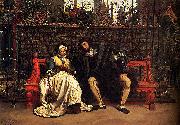 |
James Joseph Jacques Tissot
|
|
James Jacques Joseph Tissot (15 October 1836 - 8 August 1902) was a French painter, who spent much of his career in Britain.
Tissot was born in Nantes, France. In about 1856, he began study at the École des Beaux-Arts in Paris under Hippolyte Flandrin and Lamothe, and became friendly with Edgar Degas and James Abbott McNeill Whistler. Tissot exhibited in the Paris Salon for the first time in 1859, two portraits of women and three scenes in medieval dress from Faust. The latter show the influence of the Belgian painter Henri Leys (Jan August Hendrik Leys), whom he had met in Antwerp in 1859. In the mid-1860s, however, Tissot began to concentrate on depicting women, often although not always shown in modern dress. Like contemporaries such as Alfred Stevens and Claude Monet, Tissot also explored japonisme, including Japanese objects and costumes in his pictures. A portrait of Tissot by Degas from these years (Metropolitan Museum of Art, New York) shows him with a Japanese screen hanging on the wall. |
|
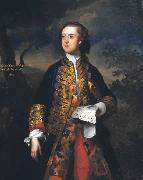 |
James Latham
|
|
James Latham (c. 1696 - 26 January 1747) was an Irish portrait painter.
James Latham was born in Thurles, County Tipperary, Ireland and possibly related to the family of Lathams of Meldrum and Ballysheehan. After some practice of his art, Latham studied for an academic year in Antwerp (1724 - 25) where he became a Master of the Guild of St Luke. He returned to Dublin by 1725, and may have visited England in the 1740s, as the influence of Joseph Highmore, as well as Charles Jervas and William Hogarth, is evident in his work of this period. Anthony Pasquin memorably dubbed Latham "Ireland's Van Dyck". Latham died in Dublin on 26 January 1747.
Several of James Latham's portraits are in the National Gallery of Ireland collection in Dublin; one is of the famous MP Charles Tottenham (1694-1758) of New Ross, Co. Wexford, "Tottenham in his Boots" (Cat. No.411) and a second is a portrait of Bishop Robert Clayton (1697-1758) and his wife Katherine. |
|
|
|
|
|
james m cain
|
|
Born: 1 July 1892
Birthplace: Annapolis, Maryland
Died: 27 October 1977
Best Known As: Author of The Postman Always Rings Twice
|
|
|
|
|
|
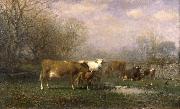 |
James McDougal Hart
|
|
(May 10, 1828 - October 24, 1901), was a Scottish-born American landscape and cattle painter of the Hudson River School. His older brother, William Hart, was also a Hudson River School artist, and the two painted similar subjects.
Hart was born in Kilmarnock, Scotland, and was taken to America with his family in early youth. In Albany, New York he trained with a sign and carriage maker possibly the same employer that had taken on his brother in his early career. Unlike his brother, however, James returned to Europe for serious artistic training. He studied in Munich, and was a pupil of Friedrich Wilhelm Schirmer in Dusseldorf.
Hart returned to America in 1853. He exhibited his first work at the National Academy of Design in 1848, became an associate in 1857 and a full member in 1859. James Hart was particularly devoted to the National Academy, exhibiting there over a period of more than forty years, and serving as vice president late in his life from 1895 to 1899. Like his brother, James also exhibited at the Brooklyn Art Association (he lived for a time in Brooklyn) and at major exhibitions around the country.
Along with most of the major landscape artists of the time, Hart based his operations in New York City and adopted the style of the Hudson River School. While James Hart and his brother William often painted similar landscape subjects, James may have been more inclined to paint exceptionally large works. An example is The Old Homestead (1862), 42 x 68 inches, in the collection of the High Museum of Art in Atlanta, Georgia. James may have been exposed to large paintings while studying in Desseldorf, a center of realist art pedagogy that also shaped the practices of Albert Bierstadt and Worthington Whittredge. William Hart, who did not seek academic European training, seems to have been more comfortable painting small and mid-sized works.
Like his brother William, James excelled at painting cattle. Kevin J. Avery writes, "the bovine subjects that once distinguished now seem the embodiment of Hart's artistic complacency." In contrast with the complacency of some of his cattle scenes, his major landscape paintings are considered important works of the Hudson River School. |
|
|
|
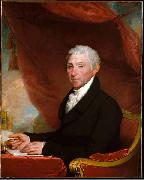 |
James Monroe
|
|
(April 28, 1758 - July 4, 1831) was the fifth President of the United States (1817-1825). Monroe was the last president who was a Founding Father of the United States, and the last president from the Virginia dynasty and the Republican Generation. His presidency was marked both by an "Era of Good Feelings" a period of relatively little partisastrife and later by the Panic of 1819 and a fierce national debate over the admission of the Missouri Territory. Monroe is most noted for his proclamation of the Monroe Doctrine in 1823, which stated that the United States would not tolerate further European intervention in the Americas.
Born in Westmoreland County, Virginia, Monroe fought in the American Revolutionary War. After studying law under Thomas Jefferson from 1780 to 1783, he served in the Continental Congress. As an anti-federalist delegate to the Virginia convention that considered ratification of the United States Constitution, Monroe opposed ratification, claiming it gave too much power to the central government. Nonetheless, Monroe took an active part in the new government and in 1790 he was elected to the Senate, where he joined the Jeffersonians. He gained experience as an executive as the Governor of Virginia and rose to national prominence when as a diplomat in France he helped negotiate the Louisiana Purchase in 1803.
During the War of 1812, Monroe held the critical roles of Secretary of State and the Secretary of War under President James Madison. Facing little opposition from the fractured Federalist Party, Monroe was easily elected president in 1816, winning over 80 percent of the electoral vote. As president, he sought to ease partisan tensions and embarked on a tour of the country. He was well received everywhere, as nationalism surged, partisan fury subsided and the "Era of Good Feelings" ensued. The Panic of 1819 struck and dispute over the admission of Missouri embroiled the country in 1820. |
|
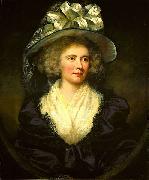 |
James Northcote
|
|
RA (22 October 1746 - 13 July 1831), was an English painter
was born at Plymouth, and was apprenticed to his father, a poor watchmaker. In his spare time, he drew and painted. In 1769 he left his father and set up as a portrait painter. Four years later he went to London and was admitted as a pupil into the studio and house of Sir Joshua Reynolds. At the same time he attended the Royal Academy schools.
In 1775 he left Reynolds, and about two years later, having made some money by portrait painting back in Devon, he went to study in Italy. On his return to England, three years later, he revisited his native county, then settled in London, where John Opie and Henry Fuseli were his rivals. He was elected associate of the Academy in 1786, and full academician in the following spring. The "Young Princes murdered in the Tower," his first important work on a historical subject, dates from 1786, and it was followed by the "Burial of the Princes in the Tower". Both paintings, along with seven others, were intended for Boydell's Shakespeare Gallery. The "Death of Wat Tyler", now in the Guildhall, London, was exhibited in 1787; and shortly afterwards Northcote began a set of ten subjects, entitled "The Modest Girl and the Wanton", which were completed and engraved in 1796. Among the productions of Northcote's later years are the "Entombment" and the "Agony in the Garden," besides many portraits, and several animal subjects, such as "Leopards", "Dog and Heron", and "Lion". |
|
|
|
|
|
 |
James Peele
|
|
James Peale (1749 - May 24, 1831) was an American painter, best known for his miniature and still life paintings, and a younger brother of noted painter Charles Willson Peale.
Peale was born in Chestertown, Maryland, the second child, after Charles, of Charles Peale (1709 - 1750) and Margaret Triggs (1709 - 1791). His father died when he was an infant, and the family moved to Annapolis. In 1762 he began to serve apprenticeships there, first in a saddlery and later in a cabinetmaking shop. After his brother Charles returned from London in 1769, where he had studied with Benjamin West, Peale served as his assistant and learned how to paint.
Peale worked in his brother's studio until January 14, 1776, when he accepted a commission in the Continental Army as an ensign in William Smallwood's regiment. Within three months he was promoted to captain, and during the next three years fought in the battles of Long Island, White Plains, Trenton, Brandywine, Germantown, Princeton, and Monmouth. He resigned his army commission in 1779, and moved to Philadelphia to live with his brother. In 1782 he married, after which he established his own household and artistic career. (One notable later collaboration, however, was in 1788 to make floats for Philadelphia's Federal Procession in honor of the newly drafted United States Constitution.) |
|
|
|
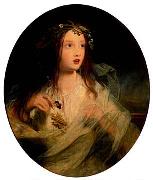 |
James Sant
|
|
(1820-1916) was a British painter specializing in portraits, and a member of the Royal Academy. Sant was born in Croydon and taught by John Varley and Augustus Wall Callcott. He lived to the age of 96 and produced an astonishing number of canvases for exhibition at the Academy, some 250 of them, from 1840 through 1904. He was elected to the RA in 1870, and in 1872 Sant was appointed Principal Painter in Ordinary (official portraitist) to Queen Victoria and the royal family. Sant resigned from the RA in 1914 to "make room for younger men." His work can be found at the Tate Gallery.
His brother George Sant (1821 - 1877) was a landscape painter. His sister Sarah Sherwood Clarke (who married Frederick Clarke, Superintendent and later Secretary of the LWS Railway) was an artist of great talent, but all that remains of her work is a collection of 48 different views of Scotland from 1854; these were exhibited for the first time at the "Watercolours & Works on Paper Fair" in London in February 2010.
|
|
|
|
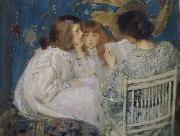 |
James Shannonc
|
|
born in the United States and moved to England in 1878 where he trained at South Kensington
1862-1923
|
|
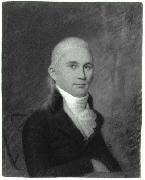 |
James Sharples
|
|
(1751 or 1752 in Lancashire - 26 February 1811 in New York ) was an English portrait painter and pastelist, who moved to the United States in 1794. He first exhibited at the Royal Academy in 1779.
James was first intended for the Catholic priesthood, but became an artist instead.Sharples headed a family of successful portrait artists, including his third wife Ellen Sharples. He had four children, George by his first wife, Felix Thomas Sharples from his second marriage (c. 1786- after 1823), and James Sharples Jr.(c. 1788-1839) and daughter Rolinda Sharples (1793-1838) with this third wife, Ellen. Felix, James Jr. and Rolinda joined the family enterprise at ages 17, 15, and 13 respectively. Before marrying Ellen Wallace, James had been active in Bristol, Liverpool and Bath, where he taught drawing. Ellen was a lady of French extraction who had relations in America. The family left for the United States in 1796, but, according to Ellen's diaries, their ship fell into the hands of the French, and for seven months the family spent time in Brest, near Cherbourg. Landing in New York, James quickly became popular for his small portraits in pastel and his miniatures. From 1796 to 1801 he worked mainly in Philadelphia and New York, securing portrait commissions. The family traveled throughout New England region as itinerant portrait painters, looking for work and making inexpensive copies from the originals portraits they had made of popular and well-known figures, such as George Washington and James Madison.
|
|
|
|
|







